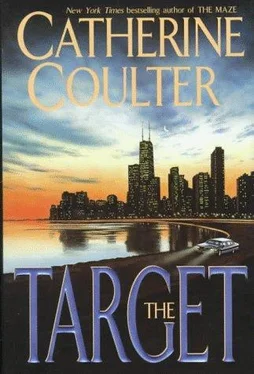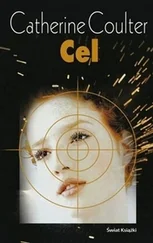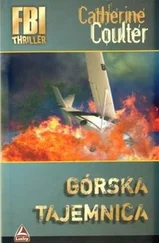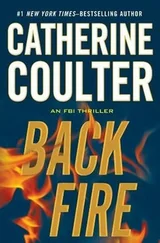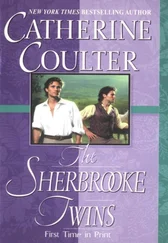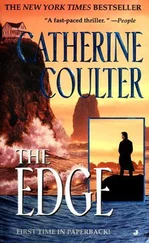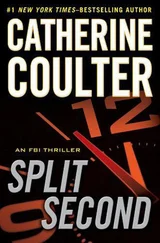Catherine Coulter
The Target
HE SAW THE man clearly: tall, with dark clothes, a stark figure against the misty gray sky. He was walking into the big granite building, ugly and flat-looking, with scores of windows that didn't look out over much except if you were up high. Then, suddenly, he was behind the man, just over his shoulder, keeping pace with him, watching him take the elevator to the nineteenth floor. He was nearly beside him as he walked down the long corridor and opened the door to a large office. A smiling receptionist greeted him, laughing at something he said. He watched the man greet two other people, a young man and a young woman, both well dressed, both obviously subordinate to him. He went into a large office with the man, saw a United States flag, a huge desk with its computer on top, the built-in bookshelves behind him, the windows beside him. He punched up the computer. Then, he was right behind the man; he could have reached out and helped him put on the long black robe. He watched him fasten the two clips closed. The man opened a door and walked into a big room, the look on his face somber, becoming cold, all the earlier humor wiped clean. There was a buzz. It stopped abruptly when he came into the room. Then the place went deathly silent.
Suddenly the room began to spin, faces blurred into one another, the very air of the room turned dark and darker still, and then the great main doors burst open and three men slammed into the room. They were carrying guns, assault guns like Russian AK47s. They were shooting, people were screaming, blood was spewing everywhere. He saw the man's face tighten with horror and fury. He saw the man suddenly leap over the railing that had separated him from the rest of that roomful of people, his black robe swirling. His leg was up, he was turning, striking out, his motion so fast it was hard to see it clearly.
Someone screamed loudly.
He was right behind the man now, heard him breathe, could feel the controlled rage in him, the vicious tension and determination, and wondered.
Suddenly, the man whirled about again, turning this time to face him. He stared at himself, looked deeply into the eyes of a man who had just killed and would kill again. He felt the spit pool in his mouth, the coiled muscles, and felt his arm fly out, striking a man's throat.
He jerked up, flailing at the single sheet that was wound tightly around him like a mummy's shroud, a yell dying on his lips. He was soaked with sweat, his hair plastered to his head. His heart was pounding so fast and hard he thought he'd explode. Again, he thought, that bloody dream yet again. He didn't think he could stand it.
An hour later, he let himself out of his house, carefully locking the door behind him. He was on the way to his car when a man jumped out of the bushes and blinded him with a good half dozen photo flashes. It was too much.
He grabbed the photographer, hauled him up by his shirt-front, and yelled right in his face, "You've gone over the line, you little bastard." He grabbed his camera, pulled the film out, and threw him aside. He tossed the camera to the man, who was lying on his back, gaping at him.
"You can't do that!"
"I just did. Get off my property."
The man scrambled to his feet, holding his camera to his chest. "I'll sue you! The public has a right to know!"
He wanted to beat the guy senseless. The urge was so strong he was shaking with it. It was then he knew he had to leave. Otherwise it might not stop before he went nuts and really hurt one of the jerks. Or he simply just went nuts.
ROCKY MOUNTAINS SPRING
HE STOOD AT the edge of the mountain that sheered down a good two hundred feet before smoothing out into tree-covered ledges and gentle wildflower-covered slopes and sharp gaping ridges. He breathed in the thin air that was so fresh it burned his lungs, but, truth be told, it burned less today than it had yesterday. Soon, the frigid clean air at nearly six thousand feet would become natural to him. It had been only yesterday that he'd realized he hadn't thought all day about a telephone, a TV, a radio, a fax machine, the sound of other voices coming at him from all sides, about people grabbing at him, shouting questions six inches from his face. And those blinding explosions of white from the ever-present flashbulbs. Now, he figured, at last he was beginning to let go, to forget for stretches of time what had happened.
He looked across the valley at the massive, — raw mountains that stretched mile upon mile like unevenly spaced jagged teeth. Mr. Goudge, the owner of the Union 76 gas station down in Dillinger, had told him that many of the locals, lots of them Trekkies, called the whole mess of knuckle-shaped mountains the Ferengi Range. The highest peak rose to twelve thousand feet, bent slightly to the south, and looked like a misshapen phallus. He wasn't about to climb a mountain with so unsubtle a shape. The folks down in Dillinger joked about that peak, saying it was a sight with snow dropping off it in the summer.
He was aware again as he was so often of being utterly alone. At his elevation there were thick forests of conifers, mainly birch, fir, and more ponderosa pine than anyone could begin to count. He'd seen lots of quaking aspen too. No logging companies had ever devoured this land. On the higher-elevation peaks across the valley, there were no trees, no flowers as there were here in his alpine meadow, just snow and ruggedness, so much savage beauty, untouched by humans.
He looked toward the small town of Dillinger at the far end of the valley that stretched from east to west below. It claimed fifteen hundred and three souls. Silver mines had made it a boomtown in the 1880s, nearly bursting the valley open with more than thirty thousand people-miners, prostitutes, store owners, crooks, an occasional sheriff and preacher, and very few families. That was a long time ago. The descendants of those few locals who had stuck it out after the silver mines had closed down now catered to a trickle of summer tourists. There were cattle in the valley, but they were a scruffy lot. He'd seen bighorn sheep and mountain goats coming down the slopes really close to the cattle, pronghorn antelope grazing at the lower elevations, and prowling coyotes.
He'd driven his four-wheel-drive Jeep down there just once since he'd been here to stock up on groceries at Clement's grocery. Had it been Tuesday? Two days ago? He'd bought a package of frozen peas, forgetting that he didn't have a freezer, just a small high-tech refrigerator that was run off a generator sitting just outside the cabin. He'd cooked those frozen peas on his wood-burning stove, then eaten the entire package in one sitting next to the one bright standing lamp that also worked off the generator.
He stretched, caught a glimpse of two hawks flying low, looking for prey, and took his ax back to the stump beside the cabin where he was splitting logs. It didn't take him long to pull off his down jacket, then his flannel shirt, then his undershirt. And still he worked up a sweat. His rhythm sped up. The sun felt hot and good on his skin, seeping in to warm his muscles. He felt strong and healthy. He was in business.
He knew he had more logs than he could use for the next week, but he just kept to that hard, smooth rhythm, feeling his muscles flex and loosen, grow tight with power, and release.
He stopped a moment to wipe the sweat off his face with a sleeve of his shirt. Even his sweat smelled fresh, as if his innards were clean.
He heard something.
A very faint sound. It had to be an animal. But he'd gotten used to the owls and the sparrow hawks, to the chipmunks and the skunks, and to the wolves. This sound wasn't one of them. He hoped it wasn't another person invading his mountain. His was the only cabin in the high meadow. There were other cabins, but they were lower, at least a half mile away. No one came up here except maybe in the summer to hike. It was mid-April. No hikers yet. He hefted his ax again. He froze in midswing when the sound came again.
Читать дальше
